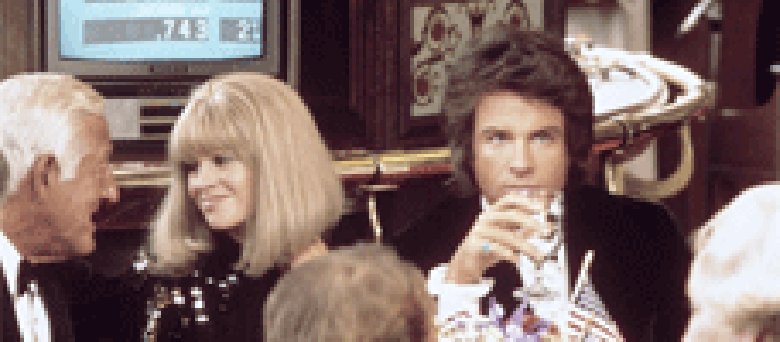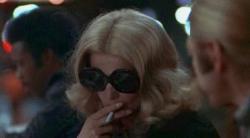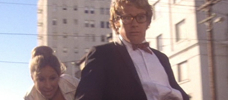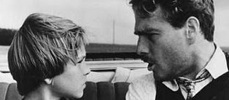Credits
Feature by: Cullen Gallagher, Leo Goldsmith, Evan Kindley, Jenny Jediny, and Brynn White
Posted on: 17 May 2010
Related articles:
Features
92YTribeca Film Series: Not Coming to a Theater Near You
The Screwball Comedy is one of classic Hollywood’s most beloved genres. Its inception is most commonly cited as Frank Capra’s It Happened One Night, originally released in 1934. While one may find traces of the genre earlier – in the in the racy Pre-Code films made prior to moral mandates of the Production Code (which were, coincidentally, strictly enforced beginning in 1934, the same year as Capra’s film), or even the cosmopolitan comedies of manners made by Ernst Lubitsch – It Happened One Night so thoroughly encapsulates the genre’s unique sensibility that it makes a perfect starting point. Claudette Colbert is an heiress on the run from her high society father who kidnapped her because he disapproves of her marriage below her class to an aviator. Clark Gable is a down-and-out reporter in need of a good scoop. Fate – or coincidence – places the pair on a bus together. Recognizing the potential for a good story, Gable helps Colbert cross the country incognito in exchange for an exclusive feature. Somewhere along the open road, in between hitch hiking and sleeping in barns, their open contempt for one another turns into a fond romance.
What distinguishes It Happened One Night from the legions of love stories that came before (and, for that matter, the nearly eighty years of them still to come)? Screwball’s unique alchemy lies in its fusion of Slapstick and Romantic Comedy, a deft blending of pratfalls and an equally dexterous verbal repartee, and its delicate matching of a zany plot with a fittingly quirky romance. Madcap mayhem must abound, with no shortage of eccentric characters (in both major and minor), and nonconformity must always triumph of social convention. Its distinctly zippy dialogue is at once frank and candid in its discussion of sexual politics, but at the same time rife with subtle innuendo and clever turns of phrase; all of which are to be found in It Happened One Night, and continue to appear in any number of other classic examples of the Screwball Comedy, from Leo McCarey’s The Awful Truth and Howard Hawks’ Bringing Up Baby to George Cukor’s The Philadelphia Story and Preston Sturges’ The Lady Eve.
In his book Pursuits of Happiness, philosopher Stanley Cavell highlights a distinct characteristic of Screwball Comedies (though he shies away from that particular word) by categorizing them as “comedies of remarriage,” as opposed to the conventional Shakespearean “comedy of marriage.” The distinction is important because it not only locates a certain break with (or, at least, a modification of) narrative tradition, but it emphasizes the worldliness of the characters. They aren’t naïve lovebirds, but instead are married, divorced, or otherwise “experienced” persons. As is the case with It Happened One Night (as well as The Awful Truth, Bringing Up Baby, and The Philadelphia Story), problems surrounding “marriage” are what set the plot into motion. This lays down the groundwork for one of Screwball’s most significant features, which is its open discussion of social propriety and the pervasive notions of love, sex, and the bonds of matrimony. In this way, Screwball Comedies can be seen as moral barometers that overtly tell us a lot about their times through their dialogue.
These are the characteristics of the classical Screwball Comedy as it was originally iterated from the mid-1930s through the 1940s and into the early 1950s. So, what is the case for a specifically “1970s” form of Screwball Comedy?
The late 1960s and early 1970s brought a wave of new blood into Hollywood, revitalizing – if not revolutionizing – the whole industry. These filmmakers constituted a generation that was raised at the cinemas, being but children when the likes of Capra, Cukor, Hawks, McCarey, and Sturges were making their Screwball magic during the Great Depression and into World War II. Instead of abandoning old forms, this new breed of Hollywood moviemakers paid homage to their predecessors by updating the Screwball sensibility to modern times, and making it as culturally and socially relevant to the 1970s as the genre initially was to the 1930s and 1940s.
This feature will focus on five films made in Hollywood between 1971 and 1975 from four filmmakers: John Cassavetes’ Minnie and Moskowitz; Elaine May’s The Heartbreak Kid; Peter Bogdanovich’s Paper Moon and What’s Up Doc?; and Hal Ashby’s Shampoo. Each of them came from different backgrounds and entered the film industry in their own ways – Cassavetes came from live TV and independent cinema, May from theater, Bogdanovich was a film critic, while Ashby had won an Oscar for editing In the Heat of the Night – they are linked by common effort to modernize and personalize the Screwball Comedy. Some invoke the genre more than others: What’s Up Doc? is a self-conscious tribute to Hawks’ Bringing Up Baby, while Shampoo’s take on the “remarriage” plot (this time between a hair stylist and his former mistress) breaks with the tradition by not focusing on a single, central couple; Paper Moon’s criminal couple are definitely not lovers, but neither are they quite the father-daughter pair they con the world into thinking they are; and both Minnie and Moskowitz and What’s Up Doc? focus on oddball couples so wrong they must be right for each other.
Over the course of the next week, madcap mania will be taking over NotComing.com in anticipation of our monthly 92YTribeca screening on Saturday, May 22. This month’s selection is Minnie and Moskowitz. In the words of this film’s protagonist, Minnie Moore, “There’s some kind of craziness going on that’s not right.” Maybe not for you, Minnie, but for us in the audience, nothing could be more perfect.
Introduction by Cullen Gallagher
By Cullen Gallagher, Leo Goldsmith, Evan Kindley, Jenny Jediny, and Brynn White ©2010 NotComing.com
Reviews
We don’t do comments anymore, but you may contact us here or find us on Twitter or Facebook.








